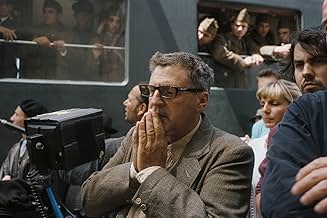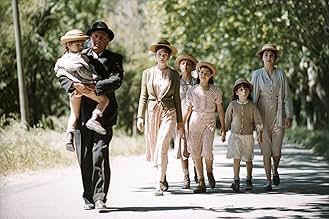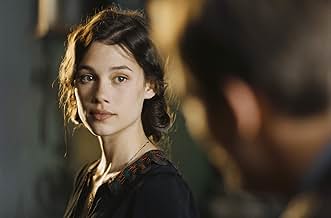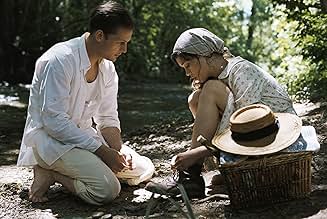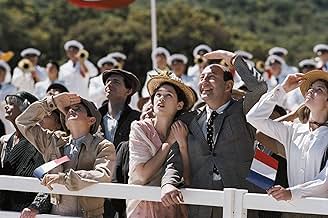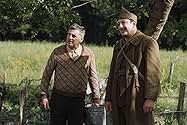AVALIAÇÃO DA IMDb
7,0/10
4,3 mil
SUA AVALIAÇÃO
No sul da França na década de 1930, um pai fica dividido entre seu senso de honra e seu profundo amor por sua filha quando ela tem problemas com o filho de um rico comerciante.No sul da França na década de 1930, um pai fica dividido entre seu senso de honra e seu profundo amor por sua filha quando ela tem problemas com o filho de um rico comerciante.No sul da França na década de 1930, um pai fica dividido entre seu senso de honra e seu profundo amor por sua filha quando ela tem problemas com o filho de um rico comerciante.
- Direção
- Roteiristas
- Artistas
- Prêmios
- 2 vitórias no total
- Direção
- Roteiristas
- Elenco e equipe completos
- Produção, bilheteria e muito mais no IMDbPro
Avaliações em destaque
Remaking a Pagnol film is asking for trouble. Film snobs will dismiss the remake without giving it a chance, though 60 years ago those same film snobs probably dismissed Pagnol as a film director, finding him hopelessly inferior to Renoir or ... Afficionados of Raimu, an unquestionably great actor - when he had a good role - will say that no one can do what he did. And they would be right; no one can out-Raimu Raimu. A force of nature, because Raimu at his best was a force of nature, cannot be imitated or equaled. But a role can be done a different way, even if the words are the same, just as different great actors can succeed at Hamlet or King Lear. And yes, I speak of Shakespeare. Theater/literature snobs can guffaw, but who cares? Let them go about their business.
And I will go about mine, which is to talk about this movie, which is remarkably moving. Moving in part because Pagnol's script was a masterpiece, yes, but also because this is a very well-done realization of it.
The first thing that struck me about this movie was the color, when you see the scenery. Pagnol, for whatever reason, really didn't do a lot with scenery in his black and white movies. This movie shows what that deprived us of. It is done in the best tradition of the color versions of Jean de Florette, Manon des sources, La gloire de mon père, and Le château de ma mère. The countryside around Salon de Provence comes alive, and is beautiful.
I was also struck by the use of music, which again is not a high point in Pagnol's version. The Italian song, so wonderfully recorded by Caruso, is used in very moving ways here. Auteuil has a better sense of how to use music in a film than Pagnol did, at least with this script.
But the heart of this movie is Pagnol's text, and this cast, a great one, does it beautifully. True, at times, as I marveled at the genius of Pagnol's text, I wondered if that meant these actors were acting it, rather than becoming the characters. That may be true in some cases, though not for Kad Merad, who becomes Philippet every bit as much as Fernandel did. I can hear Raimu reciting the lines Daniel Auteuil speaks, and beautifully, perhaps because they are so different, certainly because Raimu delivered them in a way that engraved them in my memory. But Auteuil makes them very moving as well. He is not a force of nature as Raimu was, but his Pascal is also a real character.
What I realized, over and over again watching this movie, is that the script was indeed written by a playwright, and Auteuil respects that. We still have fully-developed scenes, as movies used to have when they were still imitating theater. And, as a result, with this great script and these great actors, we have deeply moving moments, such as when Pascal says goodbye to his daughter, sending her off to raise her bastard child elsewhere. Or, even more deeply moving, when the parents of the father of her child, having just lost their son in the war, come to see the child, the last remnant of their now lost son. Every line of that scene is deeply moving: Pascal's pride in his grandson, the parents' grief and longing for their son. (I didn't care for the mother's final admission that she burned her son's letter rather than deliver it to Patricia; that was better done in the previous version.)
A film script is like a play: it can be done in more than one way, if it's worth doing - as this script most certainly is. It will not wipe away memories of Pagnol's 1940s version, nor should it. You don't have to forget Olivier's Hamlet to love Jacobi's, or Branaugh's, or ... I suspect the very film snobs who dismiss Pagnol's own work will cause this film not to enjoy the success it deserves, but that would be a real crime. This is, in fact, a wonderful realization of Pagnol's very beautiful, very wonderful script.
---------------------------------
I watched this movie again this evening, and really have nothing to add to what I wrote before, other than to say that it is a beautiful realization of Pagnol's script. Auteuil, Merad, and Darroussin are three of modern French film's finest actors, and they all give first-rate performances here. The often wonderful dialogue is delivered as in a great movie or play, lovingly and beautifully. Watch this. It's a deeply moving and wonderful movie.
And I will go about mine, which is to talk about this movie, which is remarkably moving. Moving in part because Pagnol's script was a masterpiece, yes, but also because this is a very well-done realization of it.
The first thing that struck me about this movie was the color, when you see the scenery. Pagnol, for whatever reason, really didn't do a lot with scenery in his black and white movies. This movie shows what that deprived us of. It is done in the best tradition of the color versions of Jean de Florette, Manon des sources, La gloire de mon père, and Le château de ma mère. The countryside around Salon de Provence comes alive, and is beautiful.
I was also struck by the use of music, which again is not a high point in Pagnol's version. The Italian song, so wonderfully recorded by Caruso, is used in very moving ways here. Auteuil has a better sense of how to use music in a film than Pagnol did, at least with this script.
But the heart of this movie is Pagnol's text, and this cast, a great one, does it beautifully. True, at times, as I marveled at the genius of Pagnol's text, I wondered if that meant these actors were acting it, rather than becoming the characters. That may be true in some cases, though not for Kad Merad, who becomes Philippet every bit as much as Fernandel did. I can hear Raimu reciting the lines Daniel Auteuil speaks, and beautifully, perhaps because they are so different, certainly because Raimu delivered them in a way that engraved them in my memory. But Auteuil makes them very moving as well. He is not a force of nature as Raimu was, but his Pascal is also a real character.
What I realized, over and over again watching this movie, is that the script was indeed written by a playwright, and Auteuil respects that. We still have fully-developed scenes, as movies used to have when they were still imitating theater. And, as a result, with this great script and these great actors, we have deeply moving moments, such as when Pascal says goodbye to his daughter, sending her off to raise her bastard child elsewhere. Or, even more deeply moving, when the parents of the father of her child, having just lost their son in the war, come to see the child, the last remnant of their now lost son. Every line of that scene is deeply moving: Pascal's pride in his grandson, the parents' grief and longing for their son. (I didn't care for the mother's final admission that she burned her son's letter rather than deliver it to Patricia; that was better done in the previous version.)
A film script is like a play: it can be done in more than one way, if it's worth doing - as this script most certainly is. It will not wipe away memories of Pagnol's 1940s version, nor should it. You don't have to forget Olivier's Hamlet to love Jacobi's, or Branaugh's, or ... I suspect the very film snobs who dismiss Pagnol's own work will cause this film not to enjoy the success it deserves, but that would be a real crime. This is, in fact, a wonderful realization of Pagnol's very beautiful, very wonderful script.
---------------------------------
I watched this movie again this evening, and really have nothing to add to what I wrote before, other than to say that it is a beautiful realization of Pagnol's script. Auteuil, Merad, and Darroussin are three of modern French film's finest actors, and they all give first-rate performances here. The often wonderful dialogue is delivered as in a great movie or play, lovingly and beautifully. Watch this. It's a deeply moving and wonderful movie.
The Well Digger's Daughter (2011)
A drama set in the early 20th Century that ends up being about traditions and love and how two different kinds of families come to understand each other. While not a Romeo and Juliet story at all, it has that basic problem when two young people from different social realms fall in love.
What keeps this from becoming commonplace is the beauty of it all, including what I would call beautiful acting--heartfelt, nuanced, interesting. In a way it is the well digger, the dad played by Daniel Autueil who is the main character. He's a familiar face (if not name) to those who have seen a few French films, and he's wonderful. Though a practical man (he digs wells the old fashioned way for a living), he has a sense of dignity and honor that impresses even the rich family whose charming son has seduced the title character.
We feel no violation here, just the normal confused crossed-star love issues. War intrudes, and then the dreaded report from the front, and the families still have to cope together. For reasons you'll see.
Marcel Pagnol, the great mid-Century French writer whose story is the basis for this, was also a filmmaker, and you can feel a kind of homage or influence at play here, which adds yet another layer of appreciation.
It's also a really funny movie, one of the dramas that is so witty and warm you laugh along with the characters like you would your friends (assuming you have funny friends). I loved the whole experience. If it ends with a feeling like, okay, all is resolved one way or another, I guess that's fine. There is no epiphany here, but rather a sweet slice of life from a provincial time we'd love to never forget.
A drama set in the early 20th Century that ends up being about traditions and love and how two different kinds of families come to understand each other. While not a Romeo and Juliet story at all, it has that basic problem when two young people from different social realms fall in love.
What keeps this from becoming commonplace is the beauty of it all, including what I would call beautiful acting--heartfelt, nuanced, interesting. In a way it is the well digger, the dad played by Daniel Autueil who is the main character. He's a familiar face (if not name) to those who have seen a few French films, and he's wonderful. Though a practical man (he digs wells the old fashioned way for a living), he has a sense of dignity and honor that impresses even the rich family whose charming son has seduced the title character.
We feel no violation here, just the normal confused crossed-star love issues. War intrudes, and then the dreaded report from the front, and the families still have to cope together. For reasons you'll see.
Marcel Pagnol, the great mid-Century French writer whose story is the basis for this, was also a filmmaker, and you can feel a kind of homage or influence at play here, which adds yet another layer of appreciation.
It's also a really funny movie, one of the dramas that is so witty and warm you laugh along with the characters like you would your friends (assuming you have funny friends). I loved the whole experience. If it ends with a feeling like, okay, all is resolved one way or another, I guess that's fine. There is no epiphany here, but rather a sweet slice of life from a provincial time we'd love to never forget.
This marvelous film is based on a Pagnol novel which I had never heard of. Maybe it's well-known in France and so the title is familiar to audiences there. But in the US "The Well Digger's Daughter" should keep people away from this film in droves. In fact, the film is an old fashioned fable set in the French countryside during the period of World War I. Even though the plot turns are seen coming a mile away, the film has such charm and simple feeling and wisdom, that there is enormous pleasure in watching the story unfold. Auteuil is perfect as the father, as is every other actor, especially Astrid Bergès-Frisbey as the daughter of the title and Nicolas Duvauchelle as her 'prince'. And the music by Andre Desplat is one of his best scores. The setting and the lives of the characters are so beautifully depicted, there is so much pleasure to be had in entering their world for two hours, that it seems a shame that American audiences will have to overcome their disinclination to see a movie about a well-digger and his daughter when there is this rich and deeply emotional story waiting for them in the cinema.
Another reviewer has rightly pointed out that the title of this film in English is going to keep audiences away from the English-speaking cinemas in droves. But the original French title of which it is a translation, LA FILLE DU PUISATIER, had to be retained in France. That is because it is a remake of a famous and classic film of 1940 directed by Marcel Pagnol from his own novel, and thus it needed to have the same title, so that French people would know what it was. The screenplay adaptation of the remake is by Daniel Auteuil, who also directed the film and starred in it (playing the part of the well-digger). Auteuil, one of France's most famous actors, has a long history of association with Marcel Pagnol's tales of early 20th century Provence. Those who like French movies will certainly remember the pair of immensely popular films based on Pagnol novels which were directed by Claude Berri and starred Daniel Auteuil, JEAN DE FLORETTE and MANON DES SOURCES (both 1986). At the moment three further Pagnol remakes are being filmed, with Auteuil in the leading role of César, of Pagnol's famous trilogy of films, known as 'The Marseilles Trilogy'. The individual tiles of the trilogy are CÉSAR, FANNY, and MARIUS. Let us hope that a full-fledged Pagnol revival gets going, as the old films as well as the new are a pure delight. Credit for keeping the flame alive must go to Pagnol's remarkable daughter, whom I visited long ago in her office on the far side of the Periphérique. She is a powerful and determined personality and she kept the old Pagnol films in distribution and arranged for all the new ones to be made, and is a fierce guardian of the integrity and continuity of the family's creative flame. The Pagnol films are about 'real people' in the South of France, where Pagnol came from, and the thick accents in the Marseilles Trilogy are a marvel to the ear, and as different from Parisian French as a Mississippi drawl is from the speech of an inhabitant of Brooklyn, or as an impenetrable Glasgow accent is from the way they speak in London. This film is a pure delight, beautifully directed by Auteuil, and featuring as his eldest daughter (the one of the title) a fresh young actress of the utmost charm named Astrid Bergès-Frisbey, aged 25, who is part Spanish and as beautiful as a rose petal sparking with Provencal dew in the morning. The story allows her to have been sent away and educated in Paris, to explain why she does not speak like the locals. She is absolutely perfect casting, has all the right qualities for the part, and does a wonderful job. Auteuil is, as usual, superb. The rest of the cast are also excellent. This is a very poignant and emotional tale, as Pagnol stories usually are, and I would rate it as an instant classic. Everyone should see it, though outside of France, I wonder how many really will. It would be a shame for anyone who enjoys and looks forward to a superb French film to miss it, as this is in the top rank.
It should be pointed out that Marcel Pagnol's movie was filmed during the first combats which lead to the 1940 defeat and Pétain's Armistice .It was the first film released in the free zone which was shown in the occupied one in 1941; its success was huge. Just to say that in 2011 ,it has not the same meaning for the audience.
It was not the first time a Pagnol 's movie had been remade in his own country ;Claude Berri remade "Manon des sources " which he divided into two parts , considerably reducing the central role of the schoolteacher ;Auteuil was featured in Berri's film ,so it was only natural that he tackled "la fille du puisatier".
That said ,taking on Raimu's and Fernandel's parts was a challenge ; Auteuil's movie doesn't make them forget , it was insurmountable to surpass these monstres sacrés.
His movie is faithfull to its model ,it's shorter ,which is not a bad thing, for the 1940 work dragged on sometimes ;it was also impossible to transfer it to our era ,for the melodramatic side is obsolete today .
Auteuil adopts a welcome provençal accent ,so does Kad Merad :both actors are as efficient in comedy as in drama ;the same can be said about the excellent Darroussin(taking on Charpin's role) and Sabine Azema but they do not have any accent (because it sounds too prole ?)Azema has a tendency to overact .Auteuil's son portrays his grandson !
The cinematography is impeccable ,taking advantage of the provençal landscapes,where Patricia wanders (the first one ,Josette Day ("la belle et la bête",was IMHO more gracious and had a better way to wear the hat ); it's a good work ,useful to introduce Pagnol to the new generations (colors help),but I hope they 'll try and see the black and white one.
It was not the first time a Pagnol 's movie had been remade in his own country ;Claude Berri remade "Manon des sources " which he divided into two parts , considerably reducing the central role of the schoolteacher ;Auteuil was featured in Berri's film ,so it was only natural that he tackled "la fille du puisatier".
That said ,taking on Raimu's and Fernandel's parts was a challenge ; Auteuil's movie doesn't make them forget , it was insurmountable to surpass these monstres sacrés.
His movie is faithfull to its model ,it's shorter ,which is not a bad thing, for the 1940 work dragged on sometimes ;it was also impossible to transfer it to our era ,for the melodramatic side is obsolete today .
Auteuil adopts a welcome provençal accent ,so does Kad Merad :both actors are as efficient in comedy as in drama ;the same can be said about the excellent Darroussin(taking on Charpin's role) and Sabine Azema but they do not have any accent (because it sounds too prole ?)Azema has a tendency to overact .Auteuil's son portrays his grandson !
The cinematography is impeccable ,taking advantage of the provençal landscapes,where Patricia wanders (the first one ,Josette Day ("la belle et la bête",was IMHO more gracious and had a better way to wear the hat ); it's a good work ,useful to introduce Pagnol to the new generations (colors help),but I hope they 'll try and see the black and white one.
Você sabia?
- CuriosidadesJacques' motorcycle is a Triumph Speed Twin 5T.
- Erros de gravaçãoWhen Pascal visits her sister Nathalie to check on Patricia, Nathalie is heard humming Nina Rota's Romeo and Juliet theme, which wasn't written until 1968.
- ConexõesRemake of La fille du puisatier (1940)
- Trilhas sonorasCore 'n Grato
Written by Salvatore Cardillo and Alessandro Sisca
© BMG Ricordi Publishing
Avec l'autorisation d'Universal Music Vision
Sung by Enrico Caruso
(p) Recorded prior to 1972. All right reserved by BMG Music
Avec l'aimable autorisation de Sony Music Entertainment France
Principais escolhas
Faça login para avaliar e ver a lista de recomendações personalizadas
- How long is The Well-Digger's Daughter?Fornecido pela Alexa
Detalhes
- Data de lançamento
- País de origem
- Centrais de atendimento oficiais
- Idioma
- Também conhecido como
- The Well-Digger's Daughter
- Locações de filme
- Chapelle Saint-Sixte, Eygalières, Bouches-du-Rhône, França(some exteriors)
- Empresas de produção
- Consulte mais créditos da empresa na IMDbPro
Bilheteria
- Orçamento
- € 12.500.041 (estimativa)
- Faturamento bruto nos EUA e Canadá
- US$ 386.368
- Fim de semana de estreia nos EUA e Canadá
- US$ 10.273
- 22 de jul. de 2012
- Faturamento bruto mundial
- US$ 13.194.167
- Tempo de duração1 hora 49 minutos
- Cor
- Mixagem de som
- Proporção
- 1.85 : 1
Contribua para esta página
Sugerir uma alteração ou adicionar conteúdo ausente

Principal brecha
By what name was A Filha do Pai (2011) officially released in Japan in Japanese?
Responda

